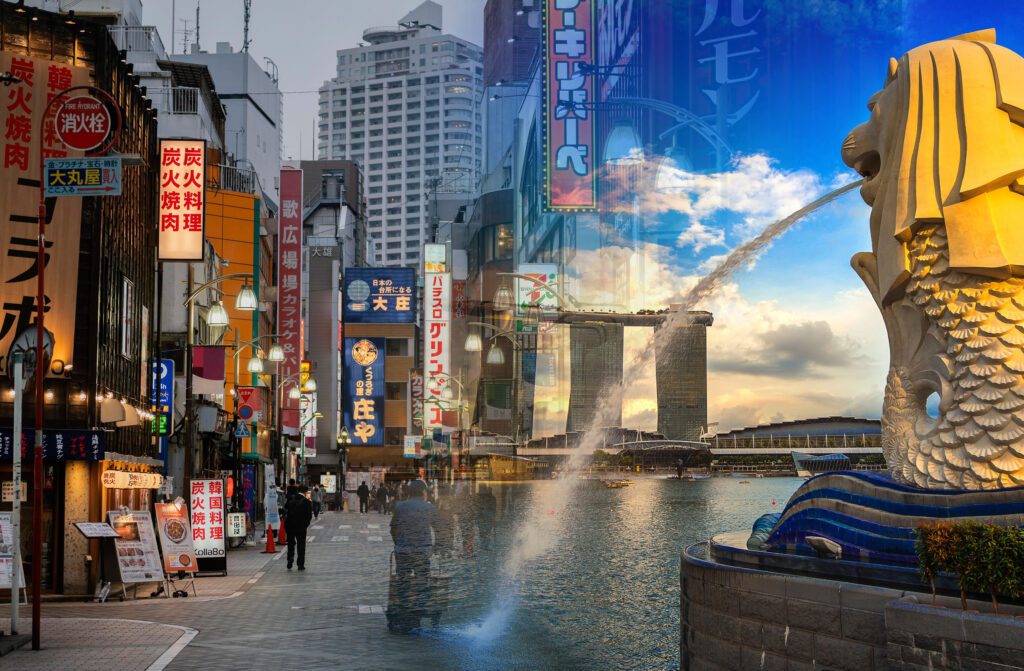

In the ever-evolving landscape of Asian markets, businesses face pivotal decisions when expanding. Singapore and Japan stand out as leading options, each presenting distinct advantages. This analysis compares the strategic considerations of doing business in Singapore vs Japan, exploring factors like economic stability, regulations, culture, and market prospects. By scrutinizing these dynamics, businesses can refine their expansion strategies and tap into the immense potential of these influential markets.
Business Environment
Singapore stands out as the top choice for foreign companies due to its global accessibility, tax advantages, streamlined incorporation process, government grants, and other incentives offered by ACRA. Meanwhile, Japan, renowned for its high-tech landscape and affluent population, has faced challenges with its traditional reliance on paperwork, worsened by the global pandemic, which led to a 4.7% decrease in GDP in 2020, prompting a sudden shift towards digitalization among corporations.
Location
Foreign entrepreneurs often choose Singapore as their gateway to enter the Southeast Asian market, leveraging its strategic location and robust infrastructure. Unlike Japan, which primarily targets the East Asian and Japanese markets, Singapore offers easier access and a more favorable environment for business expansion into the region.
Business Language
Singapore holds the advantage for international business due to its top-notch English proficiency, scoring first in Asia with an EF EPI of 635. This linguistic capability, coupled with widespread proficiency in Chinese, Malay, and Tamil among Singaporeans, facilitates seamless communication with a diverse population. In contrast, Japan, ranking 13th in English proficiency in Asia, primarily operates in Japanese, presenting potential language barriers for foreign businesses.
Incorporation and Setup Process
In Singapore, incorporation procedures are streamlined and accessible to both local and foreign investors through BizFile+, with most enterprises incorporated within 1-3 business days. In contrast, Japan imposes minimum requirements for foreign investors, including a personal bank account or a director with a bank account in Japan and a registered address in the country.
However, the incorporation process in Japan may pose challenges for foreigners due to bureaucratic procedures predominantly in Japanese, making Singapore a more favorable choice for efficient and accessible business establishment.
Annual Filing Requirements
In Singapore, entrepreneurs can swiftly submit their paperwork in accordance with the incorporation requirements via BizFile+ for examination by ACRA. Conversely, establishing a company in Japan entails additional hurdles for foreign investors, such as obtaining a manager or investor visa, notarizing articles of incorporation, and acquiring a corporate seal. Singapore’s streamlined process and support services make it a more efficient and hassle-free business setup.
Business Visa Requirements
Foreign entrepreneurs and specialists seeking to work in Singapore can apply for an Employment Pass or EntrePass, granted by the Ministry of Manpower, while Japan offers the Start-up Visa alongside Manager and Investor Visas to attract foreign investors. Singapore’s streamlined visa processes and variety of options make it compelling for those looking to establish themselves or their businesses abroad.
Taxation
Singapore boasts one of the world’s most competitive tax systems, with a flat rate of 17%, along with tax incentives and benefits for foreign corporations. In contrast, Japan implements bracketed tax rates, with rates going as high as 23%.
Bureaucracy
Singapore’s bureaucracy is renowned for its efficiency, typically processing procedures, registrations, and applications within 3 to 5 working days, contributing to Singapore’s status as one of Asia’s leading economies despite occasional delays. In Japan, the bureaucracy is similarly efficient, drawing its workforce from prestigious universities, but the predominance of Japanese-language forms poses challenges for foreign applicants seeking registrations, permits, and compliance.
Openness to Trade
Singapore, a modern city-state in Southeast Asia with a population of 5.5 million, is a major financial hub boasting a $473 billion stock market and is forecast to dominate almost a third of agri-commodity trade by 2025. Its success in global trade is attributed to factors such as its strategic location, minimal corruption, skilled workforce, low tax rates, and advanced infrastructure, which attract thousands of multinational corporations.
Singapore’s asset management industry is further bolstered by refined tax incentives and advantageous economic treaties with over 70 countries. Meanwhile, Japan, with its open stance on international trading, saw 31% of its GDP contributed by international trade and investments in 2020, while Singapore’s trade to GDP ratio stood at 321% the same year, emphasizing its robust encouragement of foreign investment and trade.
Global Competitiveness
According to the ranking of the World Economic Forum’s Global Competitiveness Index, Singapore tops the charts as the most globally competitive nation, with a score of 84.8 out of 100. Following closely behind is Japan, ranking 6th overall with a score of 82.3 out of 100.
A Snapshot Comparison | Singapore vs Japan
Japan, the third-largest global economy, offers economic sophistication but has bureaucratic challenges. Singapore, a major financial hub, excels in ease of business, low taxes, and advanced infrastructure. The table below provides a quick comparison of key factors for businesses considering these two environments.
| Aspect | Singapore | Japan |
| Economic Factors | ||
| Economic Size | Major Asian financial hub | Third-largest economy in the world |
| Industries | Trade, financial, agri-commodity, technology | Automobiles, electronic equipment, chemicals |
| Top Export Destinations | Global trade, strong ties to Asia-Pacific | United States, China, South Korea, Thailand, Hong Kong |
| Global Companies Headquarters | Attracts 7,000+ multinational corporations | 51 Fortune Global 500 companies |
| Labor Force and Education | ||
| Educated Labor Force | Highly educated workforce, 59% tertiary education | 9th in quality of education, 3rd in scientists |
| Incentives for Skilled Labor | Incentive packages for hiring skilled labor | Skilled labor, but complex bureaucratic process |
| Business Environment | ||
| Ease of Doing Business | 2nd (World Bank) | 34th (World Bank) |
| Corporate Tax System | 17% | 23% |
| Government Cooperation with Global Initiatives | Adapts to FATCA, AIFMD and tax treaties | Stable politically, but bureaucratic |
| Infrastructure and Connectivity | ||
| World-Class Infrastructure | Top-notch transportation, network-ready | High connectivity, advanced infrastructure |
| Strategic Location | Crossroads of maritime routes, proximity to major markets | Strong global ties, strategic location |
| Strong Points | Attracts multinational corporations, strong connectivity, easy business environment | Third-largest economy, stable, strong R&D, High connectivity, but bureaucratic process |
Where Premia TNC Comes Into the Picture
Experience a simplified business setup journey with Premia TNC, tailored for international corporations venturing into Singapore or foreign individuals aiming for incorporation. Our all-inclusive services demystify the complex procedure, offering advice on incorporation and aiding in pivotal choices, such as appointing a local director. Trust our proficiency for the smooth and triumphant launch of your enterprise in Singapore.
FAQs for Doing Business in Singapore vs Japan
1. How does Singapore's business environment compare to Japan's?
Singapore offers a more efficient, transparent, and business-friendly environment with low bureaucracy and favorable tax rates. Japan, while innovative, often presents challenges with bureaucratic hurdles and a traditional corporate culture.
2. What advantages does Singapore offer over Japan for foreign investors?
Singapore serves as a regional hub with stable politics, strong legal frameworks, and excellent infrastructure, providing access to Southeast Asia's burgeoning markets. In contrast, Japan's insular tendencies, complex regulations, and higher taxes may deter foreign investment.
3. How do Singapore's tax and regulatory frameworks differ from Japan's?
Singapore boasts low corporate taxes, tax incentives, and a streamlined regulatory system, fostering business growth and innovation. Japan, in comparison, has higher taxes, intricate regulations, and bureaucratic complexities that can impede business operations and profitability.




















